
Journal of Experimental Zoology Part A-Ecological and Integrative Physiology
metrics 2024
Empowering research for a sustainable biological future.
Introduction
The Journal of Experimental Zoology Part A - Ecological and Integrative Physiology, published by WILEY, is a distinguished peer-reviewed journal focusing on ecological and evolutionary physiology, providing a robust platform for research that bridges both ecological and integrative physiological concepts. With an impressive impact factor and recognition as a Q1 journal in both Animal Science and Zoology and Ecology, Evolution, Behavior and Systematics in 2023, it positions itself as a leader in advancing our understanding of organismal biology and environmental interactions. The journal is committed to open access, offering researchers and professionals worldwide the opportunity to share and disseminate their findings freely. Since its inception in 2017, it has rapidly gained prominence—ranking within the top percentiles of Scopus Ranks across several disciplines, including genetics and molecular biology. This not only underscores its relevance but also highlights its vital role in facilitating interdisciplinary approaches essential for addressing contemporary biological challenges. Researchers, educators, and students alike will find in this journal a valuable resource for cutting-edge studies and innovative methodologies in the field.
Metrics 2024
 0.82
0.82 1.90
1.90 2.40
2.40 25
25Metrics History
Rank 2024
Scopus
IF (Web Of Science)
JCI (Web Of Science)
Quartile History
Similar Journals

MARINE AND FRESHWATER BEHAVIOUR AND PHYSIOLOGY
Exploring the Depths of Aquatic LifeMARINE AND FRESHWATER BEHAVIOUR AND PHYSIOLOGY, published by Taylor & Francis Ltd, is a renowned academic journal dedicated to advancing the understanding of the behavioral and physiological aspects of aquatic organisms. Established in 1994, the journal serves as a pivotal platform for researchers and professionals in the fields of Aquatic Science and Oceanography, offering valuable insights into the interactions between aquatic species and their environments. With an impact factor reflecting its significance in the academic community, it occupies a notable position in Category Quartiles, currently ranking Q3 in both Aquatic Science and Oceanography. Researchers are encouraged to explore a wide range of topics reflecting the complexity and diversity of marine and freshwater ecosystems. Although the journal is not open access, its contributions continue to influence both current research and future investigations, making it an essential resource for anyone engaged in the study of aquatic life.

JOURNAL OF EVOLUTIONARY BIOCHEMISTRY AND PHYSIOLOGY
Advancing Knowledge at the Intersection of Biochemistry and PhysiologyJOURNAL OF EVOLUTIONARY BIOCHEMISTRY AND PHYSIOLOGY, published by PLEIADES PUBLISHING INC, is a pivotal periodical that delves into the intricate relationships between biochemical processes and evolutionary dynamics. With its ISSN 0022-0930 and E-ISSN 1608-3202, this journal serves as a comprehensive platform for researchers, professionals, and students dedicated to understanding the physiological adaptations and biochemical mechanisms influenced by evolutionary pressures. Although it is not an open access journal, it offers valuable insights across its historically significant coverage spanning from 1972 to 2017, making it an essential resource for those working in agricultural, biological, and molecular sciences. Despite its current Scopus rankings revealing limited visibility within its fields, the journal remains committed to fostering scholarly dialogue and advancing knowledge in the realm of evolutionary biochemistry, especially for those exploring the ecological, genetic, and integrative physiological aspects of life.
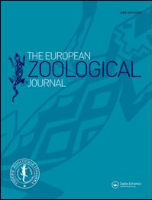
European Zoological Journal
Advancing the Frontiers of Animal ScienceEuropean Zoological Journal, published by Taylor & Francis Ltd, is an esteemed open-access publication dedicated to advancing the exciting field of zoology. Since its inception in 2017, this journal has progressively established itself as a vital resource for researchers, professionals, and students alike. With its Q2 ranking in Animal Science and Zoology as of 2023, the journal ranks in the 69th percentile among its peers, showcasing its influence and contribution to the discipline. The journal’s broad scope covers a wide range of topics within zoology, aiming to foster an understanding of animal biology and conservation efforts. As an open-access journal, it not only enhances the dissemination of knowledge but also encourages collaborative research across global communities. Situated in the United Kingdom, the European Zoological Journal invites submissions that contribute to the evolving discourse in animal sciences, and endeavors to support the scientific community in addressing pressing ecological challenges.
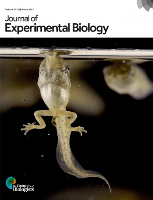
JOURNAL OF EXPERIMENTAL BIOLOGY
Fostering Excellence in Experimental Research Since 1945JOURNAL OF EXPERIMENTAL BIOLOGY, published by COMPANY BIOLOGISTS LTD, stands as a cornerstone in the fields of Animal Science, Aquatic Science, Ecology, Insect Science, and Physiology. With a rich history dating back to 1945, this esteemed journal has continually provided a platform for high-quality research, evidenced by its impressive Q1 rankings across multiple categories in the 2023 Journal Citation Reports. Located in the United Kingdom, it serves an international audience, offering critical insights and advancements in various biological sciences. As a non-open access journal, it provides rigorous peer-reviewed articles that contribute profoundly to our understanding of biological processes and their implications. With an extensive reach among researchers, practitioners, and academia, the JOURNAL OF EXPERIMENTAL BIOLOGY is not only a repository of knowledge but also a catalyst for ongoing research and innovation in experimental biology.
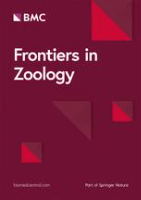
Frontiers in Zoology
Leading the charge in open-access zoological scholarship.Frontiers in Zoology is a premier, open-access journal published by BMC that has been a cornerstone of zoological research since its inception in 2004. With a commitment to advancing the field, this journal covers a broad spectrum of topics within Animal Science and Zoology, as well as Ecology, Evolution, Behavior, and Systematics. Recognized for its quality, it holds a distinguished Q1 ranking in both of these categories and ranks within the top percentiles in Scopus, with 87th and 78th percentiles, respectively. Based in the United Kingdom, it provides researchers, professionals, and students with innovative studies and findings that encourage interdisciplinary collaboration and exploration. The journal is dedicated to facilitating the open exchange of scientific knowledge, making it an essential resource for those seeking to stay at the forefront of zoological and ecological sciences.
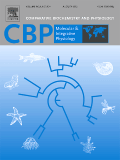
COMPARATIVE BIOCHEMISTRY AND PHYSIOLOGY A-MOLECULAR & INTEGRATIVE PHYSIOLOGY
Shaping the Future of Biochemical and Physiological Discovery.Comparative Biochemistry and Physiology A-Molecular & Integrative Physiology, published by Elsevier Science Inc, serves as a pivotal platform for cutting-edge research in the fields of biochemistry, physiology, and animal sciences. The journal, holding an esteemed presence with an ISSN of 1095-6433 and E-ISSN 1531-4332, spans a remarkable history of contributions since its inception in 1960, showcasing significant findings up to 2024. As a Q1 quartile journal in Animal Science and Zoology and featuring competitive rankings across various biochemistry and physiology disciplines, it stands out as a leading resource for both established researchers and emerging scholars alike. The journal is committed to publishing high-quality, peer-reviewed articles that deepen our understanding of molecular and integrative physiology, playing an essential role in advancing scientific knowledge and fostering interdisciplinary collaboration. With access options that prioritize the dissemination of impactful research, Comparative Biochemistry and Physiology continues to shape the dialogue within these dynamic fields.
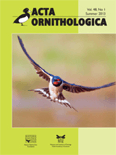
ACTA ORNITHOLOGICA
Exploring the intricate world of avian biology and conservation.ACTA ORNITHOLOGICA is a prominent peer-reviewed journal dedicated to advancing the field of ornithology. Published by the MUSEUM & INST ZOOLOGY in Poland, the journal focuses on a wide array of topics related to avian biology, ecology, and conservation, supporting the dissemination of high-quality research aimed at understanding bird populations and their habitats. With a respectable impact factor reflected in its Q3 rank within the fields of Animal Science and Zoology, ACTA ORNITHOLOGICA stands as a reliable source for professionals and academics alike. The journal is indexed in major databases like Scopus, further contributing to its visibility and accessibility to scholars worldwide. Engaging with this journal provides researchers and students with invaluable insights and opportunities to contribute to the growing body of knowledge in ornithological studies as it continues to maintain its commitment to excellence and relevance in the scientific community from its inception in 1981.
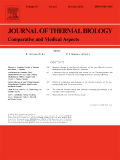
JOURNAL OF THERMAL BIOLOGY
Bridging Disciplines: The Science of Thermal BiologyJOURNAL OF THERMAL BIOLOGY, published by PERGAMON-ELSEVIER SCIENCE LTD, is a leading international journal dedicated to the interdisciplinary study of thermal biology, exploring the impact of temperature on biological systems. Established in 1975 and continuing its vital contributions through 2024, the journal has consistently ranked in the upper quartiles of its categories, notably achieving Q1 in Agricultural and Biological Sciences, Q2 in Biochemistry, and Q3 in both Developmental Biology and Physiology as of 2023. With an impressive Scopus ranking reflecting its influence and reach within key biological sciences fields, this journal serves as an essential platform for researchers, professionals, and students interested in thermal impacts on biological processes. While the journal does not offer open access, it remains a pivotal resource through its robust peer-reviewed content, fostering academic discourse and advancing knowledge at the intersection of thermal dynamics and biological research.

AUSTRALIAN JOURNAL OF ZOOLOGY
Innovating Conservation Through Research and DiscoveryAustralian Journal of Zoology, published by CSIRO PUBLISHING, serves as a premier platform for research in the fields of animal science and zoology, with a profound commitment to advancing our understanding of wildlife and ecosystems. Featuring an ISSN of 0004-959X and an E-ISSN of 1446-5698, this esteemed journal encompasses a wide range of topics relevant to ecology, evolution, behavior, and systematics. For the year 2023, it holds a commendable Q2 ranking in both Animal Science and Zoology and Ecology, Evolution, Behavior, and Systematics, demonstrating its significant impact within the academic community. With a rich publication history spanning from 1952 to 2024, the journal caters to researchers, professionals, and students by disseminating crucial findings and methodologies that contribute to effective conservation efforts and informed ecological practices. Although not an open access journal, it continues to foster collaboration and discussion among scholars in Australia and beyond. Located in Clayton, Victoria, the journal remains dedicated to its objective of enhancing knowledge in zoological sciences and addressing vital environmental challenges.

Comparative Biochemistry and Physiology D-Genomics & Proteomics
Pioneering Research at the Intersection of Genomics and ProteomicsComparative Biochemistry and Physiology D-Genomics & Proteomics, published by Elsevier Science Inc, is a premier journal in the realm of molecular biology and comparative physiology, with a focus on genomic and proteomic sciences. Recognized for its high-impact contributions, it holds a Q1 ranking in Animal Science and Zoology and was established with the vision of bridging gaps in our understanding of biological systems through experimental and comparative approaches. With an impressive Scopus ranking, this journal not only ranks among the top 12% in Animal Science and Zoology but also demonstrates commendable standings across various categories including Aquatic Science and Molecular Biology. The journal’s commitment to disseminating high-quality research makes it an essential resource for researchers, professionals, and students alike, allowing them to access critical studies that influence advancements in genomics and proteomics. While it operates under a traditional subscription model, its impactful findings are crucial for those aiming to enrich their knowledge and research capabilities in these pivotal scientific fields. Join us in exploring the transformative insights and developments that this esteemed journal has to offer for the study of genomics and proteomics.